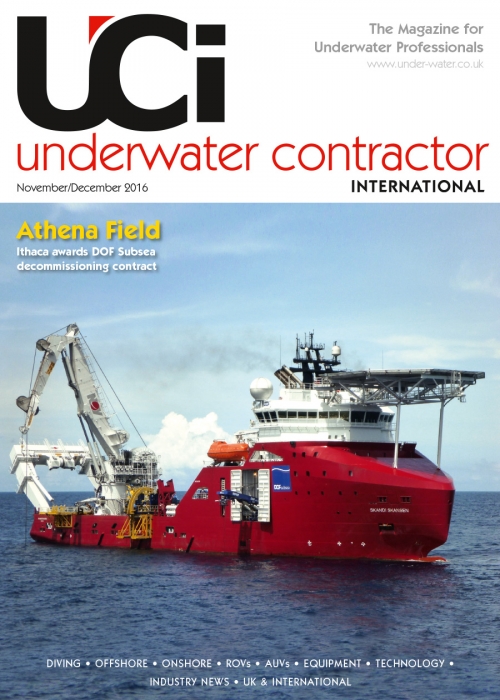
The Magazine for Underwater Professionals
![]() Sep/Oct 2015
Sep/Oct 2015
COCKS' COLUMN
Oil price uncertainty provides little cheer
This is almost certainly the most difficult column for me to write in the more than 20 years that I have been contributing to this magazine. Almost all forecasts about the oil price, including mine, have proved wrong. The stupidity of British politicians and trade union leaders knows no bounds.
Every day further cuts in numbers working in the oil and gas industries are announced and several producers are in severe difficulties. However, with Scottish oil revenue down 75% in the first three months of 2015, John Swinney, the Scottish Finance Minster, implies this does not matter as “oil was a bonus not the basis of the economy”.
On the plus side, more takeovers in the energy area are being announced and prospects for increased demand in Mexico and Iran seem good. Shell has finally been allowed to resume drilling in the Arctic.
I have given up my membership of the Unite trade union as I cannot continue to support a trade union which, like the RMT, seems more determined to dictate political events and strike than meet the real needs of its members. It is not only Labour politicians who are making a mess (with the Labour leadership election becoming a bigger joke each day), some Conservative politicians have shown their decisions are dictated more by greed than common sense. I was delighted that my local MP, Sir Malcolm Rivknd, was forced to stand down, having been conned on TV to agree to help a phoney company, saying that he spent most of his time reading and walking, not having enough to do as my MP. Michael Howard, the former Conservative leader, featured in another TV programme, being criticised by the United Nations for a company, Soma Oil and Gas, of which he is a director, making illegal payments to obtain favours.
VENTURE
The Somali venture reminds me of quite sane divers falling for a gold recovery venture off Somalia, set up by a well known Liverpool character, who later cost me a little money on the search for Bonnie Prince Charlie’s ransom money. I had fully released the “risks” but hoped to get a TV programme made to stop others losing money on similar ventures. Not all treasure hunts end in failure and one in 1687 by William Phipps salvaged silver and jewellery worth over £500 million in today’s money, as featured in a recent Financial Times article.
As I have said, it has become a lot harder to predict the future price of oil, with Saudi Arabia continuing to produce oil at a record level and the likelihood of much more oil from Iran, when sanctions are finally lifted. Other OPEC members are annoyed by the Saudi level of production. Perhaps the fact it is having to raise US$27 billion in London (the Financial Times says Saudi needs an oil price of US$105 to balance its budget) will lead to cuts in production. Britain’s government is to make it easier for fracking to begin in the United Kingdom, though gas recoveries will be nowhere as profitable as in America. In August, the International Energy Authority forecast that the oil glut will last through 2016, when it estimates that there will still be an oversupply of 850,000 barrels a day. Mexico has paid US$1 billion to insure against a further fall in oil prices, locking in a price of US$49 a barrel.
There have been a number of takeovers in the oil and gas area. ESVAGT, a Danish supplier of services to oil rigs, is being taken over for more than £200 million. The American MPLX is buying the pipeline group MarkWest for US$17.4 billion. Schlumberger is to acquire Cameron for US$14 billion. There seems likely to be no objection by Brazil to the takeover of BG by Shell.
The North Sea Decommissioning Strategy 2015 report reports that decommissioning activity will rise sharply towards the end of this decade, and hit US$90 billion by 2050. The Sunday Times says early shutdown for 40 North Sea platforms is on the cards. It is no wonder that Fairfield Energy, a company set up to develop North Sea oil fields, is now to become a decommissioning specialist. Sadly, it seems likely that this work will not need anywhere near as many divers as working fields require.
CUT
Announcements from companies servicing the energy industry vary enormously but almost all are reducing their work force. Even the John Wood Group, which was confident enough to increase its dividend by 10%, has cut 5000 jobs. It has been able to make considerable cost savings and significantly reduced its net debt. Overall, the world’s big energy groups have shelved US$200 billion of spending on new projects. On the positive side, a huge gas find has been made by ENI off Egypt and Maersk has received approval for the production of the biggest North Sea gas field discovery for a decade, so all hope is not lost.
The UK’s Conservative government is standing firm in making it harder to build onshore wind farms. A call has been made for maritime “safe havens” to safeguard the feeding and mating grounds of porpoises, basking sharks and bottlenose dolphins. A request has also been made for a £250 million pipeline to protect mussels in a river flowing from Ennerdale Water. Hopefully the green brigade will have less success in the future and we will concentrate on a way of trying to decarbonise coal emissions, as mentioned in my last column. It has recently been found that China’s carbon emissions may be significantly lower than assumed.
Sadly, in Canada a diver has been killed working on a Nova Scotia power dam inspection. It is hard to believe that, with a much higher incidence of diving fatalities in North America than in Britain, the American regulators are still proposing to allow three-man diving teams.


